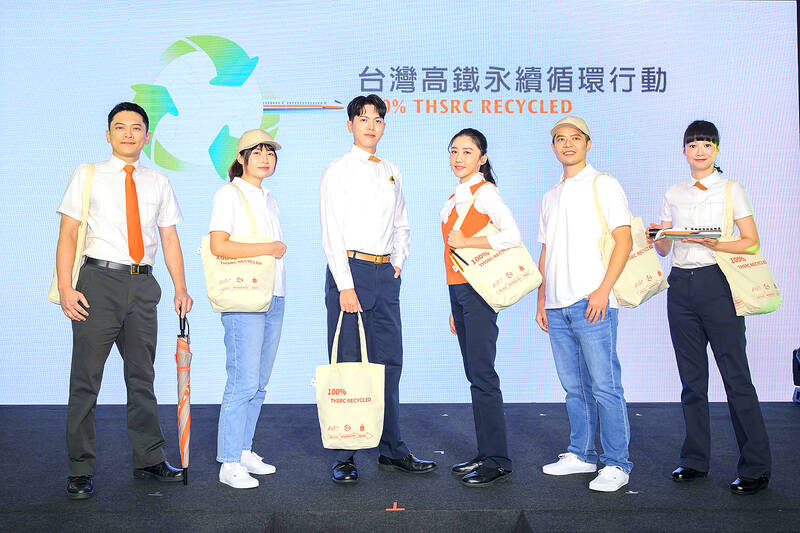The Taiwan High Speed Rail Corp (THSRC) yesterday said it is stepping up efforts to curb carbon emissions by recycling plastic bottles collected at high-speed rail stations and turning them into different products, including employees’ uniforms.
Recyclable plastic bottles and microwavable food containers account for a majority of the waste found at high-speed rail stations, statistics from the high-speed rail operator showed.

Photo: CNA
As THSRC began implementing its “100% THSRC Recycled” initiative last year, it set a goal of gradually replacing employees’ uniforms with ones made from eco-friendly fabrics, the company said.
Plastic bottles can be reprocessed to produce recycled polyester (PET), which can be used to make uniforms for THSRC employees, it said, adding that it would begin replacing shirts worn by station and onboard personnel with ones made by PET first.
The company distributes about 18,600 sets of new uniforms per year, including those for new employees and those requested by existing employees.
In a news conference, the company presented uniforms, baseball caps, pens and foldable umbrellas made from plastic bottles collected from high-speed rail stations nationwide.
It also showed shopping bags made from recycled microwavable food containers.
THSRC president James Jeng (鄭光遠) said the company has since March last year partnered with Taiwanese start-up Raingo offer umbrella-sharing services using these eco-friendly umbrellas.
He added that the service would be available in its 12 stations across the nation as well as Taoyuan and Taipei MRT stations and 500 rental shops owned by Raingo.
The company has implemented other plastic-reducing measures, such as replacing plastic covers of the seat’s headrest with ones made by wood pulp fiber and using reinforced paper lids on hot beverage cups.
New train window shutters are designed to block 92 to 95 percent of sunlight, allowing the onboard air-conditioning system to operate more efficiently.
Last year, the company said that it successfully decreased waste by 17 tonnes, which reduced carbon emissions by nearly 48 tonnes.
Meanwhile, the company would soon build its second vehicle maintenance facility at its Zuoying (左營) depot in Kaohsiung using water-conservation design and low-carbon construction materials.
With an open roof and three-dimensional vents, the air inside the facility would circulate freely, reducing reliance on air-conditioning, the company said.
About 3,660 solar panels are to be installed on the rooftop of the facility, which would collectively generate a peak power output of 1,318 kilowatts.
The facility, which is scheduled to begin operations in December 2027, would increase the rail operator’s maintenance capacity from 38 trains to 47, with the maximum number of trains parking in the depot rising from 44 to 50, the company said.
Separately, the company unveiled its track geometry inspection vehicle, which it said has greatly facilitated its track maintenance work and improved safety.
The vehicle, which the company procured from Vienna-based track maintenance machine manufacturer Plasser & Theurer, has been in use since 2023, allowing the company to detect visible anomalies on the rail surface, such as missing rail fasteners and damaged parts. The company records this data and uses it to plan maintenance operations, it said.

Three Taiwanese airlines have prohibited passengers from packing Bluetooth earbuds and their charger cases in checked luggage. EVA Air and Uni Air said that Bluetooth earbuds and charger cases are categorized as portable electronic devices, which should be switched off if they are placed in checked luggage based on international aviation safety regulations. They must not be in standby or sleep mode. However, as charging would continue when earbuds are placed in the charger cases, which would contravene international aviation regulations, their cases must be carried as hand luggage, they said. Tigerair Taiwan said that earbud charger cases are equipped

Foreign travelers entering Taiwan on a short layover via Taiwan Taoyuan International Airport are receiving NT$600 gift vouchers from yesterday, the Tourism Administration said, adding that it hopes the incentive would boost tourism consumption at the airport. The program, which allows travelers holding non-Taiwan passports who enter the country during a layover of up to 24 hours to claim a voucher, aims to promote attractions at the airport, the agency said in a statement on Friday. To participate, travelers must sign up on the campaign Web site, the agency said. They can then present their passport and boarding pass for their connecting international

Taiwan sweltered through its hottest October on record, the Central Weather Administration (CWA) said yesterday, the latest in a string of global temperature records. The main island endured its highest average temperature since 1950, CWA forecaster Liu Pei-teng said. Temperatures the world over have soared in recent years as human-induced climate change contributes to ever more erratic weather patterns. Taiwan’s average temperature was 27.381°C as of Thursday, Liu said. Liu said the average could slip 0.1°C by the end of yesterday, but it would still be higher than the previous record of 27.009°C in 2016. "The temperature only started lowering around Oct. 18 or 19

WEATHER Typhoon forming: CWA A tropical depression is expected to form into a typhoon as early as today, the Central Weather Administration (CWA) said yesterday, adding that the storm’s path remains uncertain. Before the weekend, it would move toward the Philippines, the agency said. Some time around Monday next week, it might reach a turning point, either veering north toward waters east of Taiwan or continuing westward across the Philippines, the CWA said. Meanwhile, the eye of Typhoon Kalmaegi was 1,310km south-southeast of Oluanpi (鵝鑾鼻), Taiwan’s southernmost point, as of 2am yesterday, it said. The storm is forecast to move through central